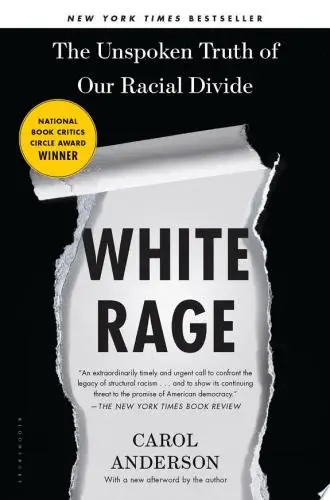Defining Sexism
In the U. S.
What's it about?
Defining Sexism by Elizabeth Hall Magill offers you a thoughtful exploration of the complexities surrounding sexism in contemporary society. This book defines sexism not just as overt discrimination but also as subtle, systemic influences that shape experiences and opportunities. You will gain insights into how cultural narratives, legal frameworks, and institutional practices contribute to persistent inequalities. By examining various contexts, Magill encourages you to critically analyze your own perceptions and engage in meaningful conversations about gender equity.
About the Author
Elizabeth Hall Magill is an author and essayist known for exploring themes of feminism, spirituality, and personal growth. Her writing often combines insightful analysis and personal narrative, providing a unique perspective on gender and societal norms. Her work encourages introspection and social awareness through a compassionate and thoughtful lens.
25 Key Ideas of Defining Sexism
Unpacking Everyday Sexism
By recognizing subtle sexist behaviors, you can actively challenge and change them in your daily life.
Think about the meeting where your ideas were repeated by a male colleague and suddenly taken seriously—a common scenario that highlights how ingrained sexism can be.
- Raising Awareness: Many sexist practices are so normalized that they go unnoticed.
- Empowering Change: Once recognized, these behaviors can be called out and altered.
- Fostering Equality: Small changes collectively foster a more equitable environment.
Observe interactions at work or social settings for a day and note any instances of gender bias, then practice speaking up with a respectful yet firm call-out.
It's easy to rationalize or dismiss sexism as 'not a big deal,' but acknowledging its impact is crucial for change.
Embracing Intersectionality
Understanding how various forms of discrimination intersect allows for a more inclusive approach to combating sexism.
Consider a tree with intertwined roots—gender can’t be disentangled from race, class, or sexual orientation; addressing one means nourishing all.
- Broader Perspective: Intersectionality uncovers the unique experiences of those facing multiple forms of discrimination.
- Comprehensive Solutions: By understanding these overlaps, solutions become more effective and equitable.
- Inclusivity: Embracing diverse perspectives fosters a more inclusive environment for everyone.
Educate yourself on the experiences of others by reading or listening to various voices in gender equality discussions.
Avoid the mistake of seeing sexism as an isolated issue; embrace a holistic view that incorporates other social dynamics.
Redefining Masculinity
Challenging traditional notions of masculinity can liberate everyone from restrictive gender roles.
Think of masculinity as a rigid mold—reshaping it allows men to express vulnerability and empathy without judgment.
- Emotional Freedom: Rejecting toxic masculinity promotes healthier emotional expression.
- Strength in Diversity: Redefining norms allows individuals to embrace diverse forms of strength and character.
- Relationship Building: Open and honest communication nurtures deeper connections.
Encourage a meaningful conversation with a male friend or relative about the pressures they face regarding traditional masculinity norms.
Don't equate strength solely with toughness; remember that vulnerability and empathy are also powerful traits.
Deeper knowledge. Personal growth. Unlocked.
Unlock this book's key ideas and 15M+ more. Learn with quick, impactful summaries.
Read Full SummarySign up and read for free!
Defining Sexism Summary: Common Questions
We recommend Defining Sexism to anyone interested in social justice, gender studies, or those looking to deepen their understanding of systemic inequalities, as it provides insightful perspectives and thought-provoking analyses that can enrich conversations and initiatives for change.
Experience Personalized Book Summaries, Today!
Discover a new way to gain knowledge, and save time.
Sign up for our 7-day trial now.
No Credit Card Needed

Similar Books

The White Night of St. Petersburg
Michel (Prince of Greece)
White Rage
Carol Anderson
Band of Brothers
Stephen E. Ambrose
Class Matters
The New York Times
The New World Order
Allen Roesch
Irvine Welsh
Robert Morace
To Kill a Mockingbird
Harper Lee
Introduction to Daisy Jones & The Six
Gilad James, PhD
The Papers of Martin Luther King, Jr., Volume I
Martin Luther King
Democracy in America
Alexis de TocquevilleTrending Summaries

Peak
Anders Ericsson
Never Split the Difference
Chris Voss
Smart Brevity
Jim VandeHei
The Psychology of Money
Morgan Housel
The First 90 Days
Michael D. Watkins
Atomic Habits
James Clear
Thinking, Fast and Slow
Daniel Kahneman
The Body Keeps the Score
Bessel van der Kolk M.D.
The Power of Regret
Daniel H. Pink
The Compound Effect
Darren HardyNew Books

Forex Trading QuickStart Guide
Troy Noonan
Comprehensive Casebook of Cognitive Therapy
Frank M. Dattilio
The White Night of St. Petersburg
Michel (Prince of Greece)
Demystifying Climate Models
Andrew Gettelman
The Hobbit
J.R.R. Tolkien
The Decision Book
Mikael Krogerus
The Decision Book: 50 Models for Strategic Thinking
Mikael Krogerus
Fichte
Johann Gottlieb Fichte
Do No Harm
Henry Marsh

